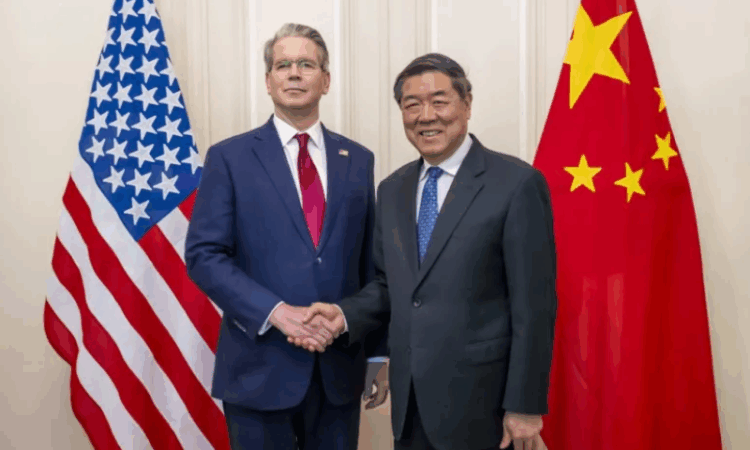London, June 9, 2025: China and the United States opened a new round of trade negotiations in London on Monday, aiming to stabilize a tentative truce after months of escalating tariffs and economic tensions. The talks, held at the historic Lancaster House, follow a preliminary round in Geneva last month and come amid renewed diplomatic contact between the two powers.
Chinese Vice Premier He Lifeng is once again leading Beijing’s delegation, while the U.S. team is headed by Treasury Secretary Scott Bessent, Commerce Secretary Howard Lutnick, and Trade Representative Jamieson Greer, according to state media and a statement by President Donald Trump.
“The meeting should go very well,” Trump posted on Truth Social on Friday, ahead of the talks. His press secretary, Karoline Leavitt, echoed the optimism in a Sunday interview with Fox News, emphasizing that Washington expects Beijing to honor the commitments made during the Geneva negotiations.
While the UK government reiterated that it is not directly involved in the talks, a spokesperson welcomed the diplomatic efforts. “We are a nation that champions free trade,” the spokesperson said. “We’ve always been clear that a trade war is in nobody’s interest, so we welcome these talks.”
One of the most contentious issues on the table is China’s slowing exports of rare earth elements — critical materials used in electric vehicle batteries, electronics, and defense technologies. U.S. officials are pushing for the resumption of these shipments, which have declined sharply following Trump’s introduction of sweeping tariffs in April.
“Rare earth shipments from China to the U.S. have slowed since President Trump’s ‘Liberation Day’ tariffs,” said Kathleen Brooks, research director at trading firm XTB. “The U.S. wants those shipments reinstated, while China is pressing for concessions on technology access, student visas, and market entry for Chinese tech firms.”
In April, Washington imposed global tariffs that hit Chinese goods especially hard, with some imports facing levies as high as 145 percent. China responded with countermeasures that raised tariffs on U.S. goods up to 125 percent.
Although the Geneva agreement in May led to a temporary 90-day tariff reduction, fundamental differences remain — especially over access to strategic resources and restrictions on Chinese firms operating in U.S. markets.
The economic fallout from the tariff standoff is already visible. According to China’s General Administration of Customs, exports to the U.S. fell by 12.7 percent in May, totaling $28.8 billion, down from $33 billion in April.
The London talks come days after Trump and Chinese President Xi Jinping held their first publicly acknowledged phone call since Trump’s return to the White House. Trump described the conversation as having reached a “very positive conclusion,” while Xi emphasized the need to “steer well and set the direction” of bilateral ties.
Alongside efforts to ease tensions with Washington, Beijing is also pursuing trade diplomacy elsewhere. It recently agreed with Canada to regularize communication channels following a period of strained ties. Canadian Prime Minister Mark Carney and Chinese Premier Li Qiang discussed trade and fentanyl control in talks last week.
Beijing is also proposing the creation of a “green channel” to simplify rare earth exports to the European Union and expedite export licenses. A China–EU summit is planned for July, marking the 50th anniversary of diplomatic relations between the two sides.








